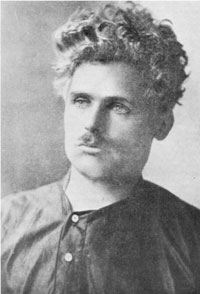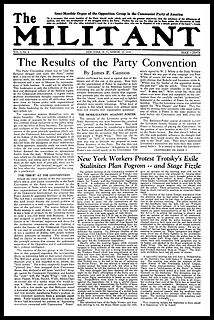
The Fourth International (FI) is a revolutionary socialist international organization consisting of followers of Leon Trotsky, also known as Trotskyists, whose declared goal is the overthrowing of global capitalism and the establishment of world socialism via international revolution. The Fourth International was established in France in 1938, as Trotsky and his supporters, having been expelled from the Soviet Union, considered the Communist International as effectively puppets of Stalinism and thus incapable of leading the international working class to political power. Thus, Trotskyists founded their own competing Fourth International.

The Socialist Party of America (SPA) was a socialist political party in the United States formed in 1901 by a merger between the three-year-old Social Democratic Party of America and disaffected elements of the Socialist Labor Party of America who had split from the main organization in 1899.

Shachtmanism is the form of Marxism associated with Max Shachtman (1904–1972). It has two major components: a bureaucratic collectivist analysis of the Soviet Union and a third camp approach to world politics. Shachtmanites believe that the Stalinist rulers of proclaimed socialist countries are a new ruling class distinct from the workers and reject Trotsky's description of Stalinist Russia as a "degenerated workers' state".
Max Shachtman was an American Marxist theorist. He went from being an associate of Leon Trotsky to a social democrat and mentor of senior assistants to AFL–CIO President George Meany.

Martin "Marty" Abern was a Marxist politician who was an important leader of the Communist youth movement of the 1920s as well as a founder of the American Trotskyist movement.
There have been various groups in Canada that have nominated candidates under the label Labour Party or Independent Labour Party or other variations from the 1870s until the 1960s. These were usually local or provincial groups using the Labour Party or Independent Labour Party name, backed by local labour councils or individual trade unions. There was an attempt to create a national Canadian Labour Party in the late 1910s and in the 1920s, but these were only partly successful.
Maurice Spector was a Canadian politician who served as the chairman of the Communist Party of Canada and the editor of its newspaper, The Worker, for much of the 1920s. He was an early follower of Leon Trotsky after Trotsky's split from the Communist International.
The League for Socialist Action was a Trotskyist organization in Canada. It was known by several names throughout its history, including the International Left Opposition (Trotskyist) of Canada, the Workers Party of Canada, the Socialist Policy Group, the Socialist Workers League, the Revolutionary Workers Party, The Club, the Socialist Education League and the Socialist Information Centre.

Albert Goldman (1897–1960) was a Belorussian-born American political and civil rights lawyer, closely associated with the American communist movement. Goldman broke with the mainline Communist Party, USA in 1933, joining the Trotskyist opposition, in which he would be a leading participant for the better part of the next two decades. Goldman is best remembered as a defendant and lead defense attorney in the 1941 Smith Act prosecution of the leadership of the Socialist Workers Party.
The Communist League of Struggle (CLS) was a small communist organization active in the United States during the 1930s. Founded by Albert Weisbord and his wife, Vera Buch, who were veterans of the Left Socialist movement and the Communist Party USA, the CLS briefly affiliated with Leon Trotsky independently of the Communist League of America. It was affiliated to the International Bureau of Revolutionary Youth Organizations until 1935. The small group dwindled and quietly was terminated in the spring of 1937.
Edward Hugo Oehler (1903–1983) was an American communist.
The Fieldites were a small leftist sect that split from the Communist League of America in 1934 and known officially as the Organization Committee for a Revolutionary Workers Party and then the League for a Revolutionary Workers Party. The name comes from the name of its leader B. J. Field.
Albert Glotzer (1908–1999), also known as Albert Gates, was a professional stenographer and founder of the Trotskyist movement in the United States. He was best remembered as the court reporter for the 1937 John Dewey Commission that examined the Stalinist charges against Trotsky in Mexico City and as a memoirist and activist in the social democratic movement in his later years.

Timofei Vladimirovich Sapronov was a Russian revolutionary, Old Bolshevik and socialist militant who was one of the leaders of the Left Opposition in the Communist Party of the Soviet Union.
The American Left consists of individuals and groups that have sought egalitarian changes in the economic, political and cultural institutions of the United States. Various subgroups with a national scope are active. Liberals and progressives believe that equality can be accommodated into existing capitalist structures, but they differ in their criticism of capitalism and on the extent of reform and the welfare state. Anarchists, communists and socialists with international imperatives are also present within this macro-movement. Many communes and egalitarian communities have existed in the United States as a sub-category of the broader intentional community movement, some of which were based on utopian socialist ideals. The left has been involved in both Democratic and Republican parties at different times, having originated in the Democratic-Republican Party as opposed to the Federalist Party.
The Spartacist League is a Trotskyist political grouping. They are the United States section of the International Communist League, formerly the International Spartacist Tendency. This Spartacist League named themselves after the original Spartacus League of Weimar Republic in Germany, but the current League has no formal descent from it. The League self-identifies as a "revolutionary communist" organization.
The third camp, also known as third camp socialism or third camp Trotskyism, is a branch of socialism that aims to oppose both capitalism and Stalinism by supporting the organised working class as a "third camp".

The Communist League of America (Opposition) was founded by James P. Cannon, Max Shachtman and Martin Abern late in 1928 after their expulsion from the Communist Party USA for Trotskyism. The CLA(O) was the United States section of Leon Trotsky's International Left Opposition and initially positioned itself as not a rival party to the CPUSA but as a faction of it and the Comintern. The group was terminated in 1934 when it merged with the American Workers Party headed by A. J. Muste to establish the Workers Party of the United States.

James Patrick Cannon was an American Trotskyist and a leader of the Socialist Workers Party.
The Socialist Workers Party (SWP) is a communist party in the United States. Originally a group in the Communist Party USA that supported Leon Trotsky against Soviet leader Joseph Stalin, it places a priority on "solidarity work" to aid strikes and is strongly supportive of Cuba. The SWP publishes The Militant, a weekly newspaper that dates back to 1928. It also maintains Pathfinder Press.







